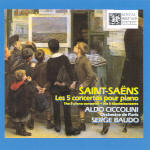This set was the Saint-Saëns piano concerto reference edition of choice until EMI remade all five works with pianist Jean-Philippe Collard and conductor André Previn. At the same time, Decca weighed in with Pascal Rogé and Charles Dutoit, and while both of these newcomers offer better sound and smoother orchestral playing than Aldo Ciccolini and Serge Baudo, these performances still retain their considerable charms. First, there’s Ciccolini’s witty, brittle, slightly “sec” playing, which perfectly suits the music’s basically neo-classical aesthetic. Second, Baudo’s accompaniments have more character and color than either Previn’s or Dutoit’s, despite the fact that the tonal quality of the Orchestre de Paris in 1971 was nothing to brag about. As to the music itself, Saint-Saëns always has had his detractors, but the bottom line is that his music’s charm often conceals considerable performance challenges, and I can personally attest to the fact that when a pianist pooh-poohs this music, it’s just as likely that he either doesn’t know it or simply can’t play it. These concertos are, one and all, delightful. If you don’t know them, you certainly should. This set offers a great way to make their acquaintance.
































